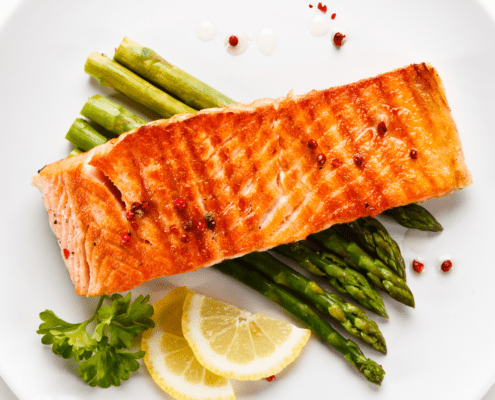What Nutritional Value Do Eggs Have?
Some common questions I’ve got from my clients over the last few years:
- Are eggs good for you?
- What nutritional value do eggs have?
- Don’t eggs have a lot of cholesterol? Should I limit my intake then?
- I have high cholesterol, I can’t eat eggs can I?
In the following post I’m going to address, and answer, the above questions. Feel free to jump between sections and read the relevant information that you want to know as there is a lot of information here. Ok, let’s get started.
There are many different types of eggs, and from different animals. When you think of eggs you likely think of chicken eggs as these are the most common type in grocery stores. Two other types of eggs that are available that you may have not known, are duck and quail eggs. Let’s focus on chicken eggs for the remainder of this post.
At the grocery store do you ever look at all the different types of eggs, and the different colors and type of cartons, and wonder what the difference between them really is? At one point I did too, so let me help you understand the different types:
- Organic: Organic describes the environment in which the eggs are raised, and is the only label with a legal definition and an independent auditor to ensure that organic standards are met. Organic chicken eggs meet Canadian health and wellness standards with: free barns, natural light indoors, open access to pastures outside and continue to have access to nests, hangers, and trash. They are also fed 100% organic food and are always provided with clean, fresh water. Of all the different types of eggs, organic are the most expensive – for obvious reasons.
- Free range: Free range is a reference to the living conditions of the chicken. Free range chickens can move in an open range barn and have access to outdoor (natural light), weather permitting. They also have general access to net, poles, and litter.
- Free-run: Free-run is also an environmental reference to the living conditions of the chicken. Free-run hens can go in open stands, but they do not have access to the outside and may not also have access to natural light. However, they usually have access to nests, hangers, and trash.
- Cage-less: Cage-less Chickens are free from cages, but that’s about all this label suggests – there is no attachment of this label to access to the outdoors, etc.
- Omega 3: This is a nutritional association label and indicates that the hens are fed with omega-3 fatty acids, such as flax seeds, in some part of their food source. As a result, this will enhance the amount of Omega-3 in the eggs they produce. There is no association with this nutritional label to their environmental conditions and it’s assumed they are confined to cages unless otherwise noted – they have no access to litter, perches, and nests.
The above classifications will often be seen together, or by themselves.
Ever wonder why different eggs are different colors? The egg color is dependent on the type of Hen laying the egg. For example, Leghorn chickens lay white eggs, while Orpington’s lay brown eggs, and Ameraucana produce blue eggs.
So what type of egg should you get then? Let’s talk about that in a bit, let’s take a look at the nutritional aspects of eggs first.
Nutrition
Macronutrients:
One medium Chicken egg is about 65 calories, and is comprised of protein and fat.
- Protein: In a 65 calorie egg there would be roughly 5-6 grams of protein, the bulk of the protein being in the egg white. If you didn’t know the role of protein in the body, it serves as the building blocks of: muscles, organs, skin and tissue, enzymes, hormones, and immune cells like antibodies.
- Here’s a Foutyfact for you: an egg is a complete protein source, which means it contains all of the essential amino acids (there’s 9 essential, 20 amino acids total). Plant based protein sources tend to be incomplete, like beans and nuts; with incomplete protein sources you need two incomplete protein sources to complement each other to provide a complete protein effect, i.e beans and corn.
- Fats: In an 65 calorie egg there would be roughly 4-5 grams of fat, almost all of it residing in the egg yolk (the yellow part). Most fat in an egg is unsaturated and is considered the best type of fat to include in a balanced diet; saturated fats on the other should be reduced, ideally to less than 10 percent of your daily caloric intake. Eggs are also a rich source of Omega-3 fatty acids, mostly docosahexaenoic acid (DHA), which are important in maintaining brain function and healthy vision. Omega-3 fatty acids are only readily available in oily fish, so eggs are a critical food alternative source for people who do not eat fish – like some vegetarians.
Micronutrients:
Chicken eggs are an excellent source of many vitamins and minerals. I’ve listed all of them below, as well as the respective role that each vitamin and mineral plays in your health.
Vitamins:
- Vitamin A – nourishes skin, immune system and normal vision.
- Vitamin B-2 (riboflavin) helps metabolism of energy, red blood cells, vision and nervous system.
- Vitamin B5 (pantothenic acid) – helps energy metabolism and mental performance.
- Vitamin B-12 – support energy metabolism, red blood cells, immune system and nervous system.
- Vitamin D – maintain healthy bones and teeth and promote calcium absorption. *Eggs are among one of the few foods that are a good source of vitamin D.
- Vitamin E – maintains the reproductive system, nervous system, and healthy muscles.
- Biotin – Helps metabolize energy, supports skin, hair and immune system.
- Choline – helps the metabolism of fat and liver function.
- Folic Acid – helps in the formation of blood and tissue growth during pregnancy.
Minerals:
- Iodine: helps thyroid function, maintains skin and nervous system.
- Iron – boost the production of red blood cells and oxygen transport throughout the body.
- Lutein and zeaxanthin – keeps the normal vision and protect age-related eye disease.
- Phosphorus – maintains bones and teeth and helps with energy metabolism
- Selenium – protects cells from oxidative damage, keeps the immune system and aids thyroid function.
Other:
- Carotenoids (lutein and zeaxanthin) – protecting against age-related macular degeneration and cataracts, as well as for their antioxidant and anti-inflammatory properties.
- Arginine (a precursor to nitric oxide) – causes blood vessels to dilate, thereby playing a key role in endothelial function.
- This is an amino acid, but I chose to put it here instead of the Protein category.
Egg recipes to try:
So, by now you should have realized that eggs are a nutritional powerhouse. With that, let’s move onto the topic of eggs and cholesterol.
For the sake of not turning this blog post into a novel I’m going to simply highlight some points from what the science says, in particular an in-depth review article:
- In the past, there was a limit on total cholesterol consumption for both the general population and those with T2DM of 300 mg per day; one egg containing approximately 200 mg cholesterol. This guideline has since been changed and there is no longer a limit on dietary cholesterol intake.
- Epidemiological studies (robust cross-comparison of multiple studies) to date have indicated very little association between a high egg intake and cardiovascular disease or mortality in the general population.
- Some studies showed no adverse effects on the lipid profile following a high egg intake, and a few showed improvements in circulating lipids with an increased egg consumption.
- A diet including more eggs than is recommended (at least in some countries) is considered safe as part of a healthy diet in both the general population, those at high risk of cardiovascular disease, those with established coronary heart disease, and those with T2DM (Type 2 diabetes mellitus).
- The background or intervention diet appears to be a key nutritional component to reducing overall cholesterol.
Science-y jibber jabber what? If only part of that made sense, or none at all, then let me simplify it for you: there is no conclusive evidence to suggest that a high egg diet will un-safely affect your cholesterol levels, even if you currently have high cholesterol.
Input from Andrea, RD:
The evidence is not persuasive/is inconclusive – literature reviews looking at the studies suggest that for a normal healthy person, restriction on eggs is not necessary. If eggs displace intake of other foods, foods you might serve with eggs, probably have an impact on serum cholesterol. However, eggs have been unfairly targeted as bad – when they can totally fit in a healthy diet. I don’t restrict egg intake in healthy individuals – as long as we’re working on other evidence based ways to manage nutrition, I think eggs come down to personal preference. They fit within a healthy diet, and if people would like them for breakfast every day – great – they’re full of nutrients, protein, are delicious, and easy.
If you have some time, watch the video below. It’s a great paradoxical re-enactment of the changing health attitude towards eggs in the recent past.
So should you eat eggs? Well if you like eggs, then yes, absolutely.
What type should you eat? Well that is up to you, but many people choose their type of egg based on ethical practices, price, convenience, etc. My suggestion would be to go organic, when you can, and try to visit the local farmers market and get your eggs there. One benefit of this is you can often talk directly to the farmer that raised the chickens, and now that you are equipped with all the proper knowledge about eggs you can ask him/her the right questions to see if you’d like to buy from him/her!
Quick tip for those that want to buy organic but are trying to keep their budget in mind: some farmers raise their eggs similar to organic farmers, but just don’t have the certification. So talk to the farmer and see how they raise their chickens and how they feed them, If their process is similar to organic but they just don’t have the certification then you can take advantage of this and pay less for a higher quality egg.
Hopefully you all found this helpful. As per usual, if you have any questions drop them in the comments below.
Till next time,
-Mike
Related Posts






